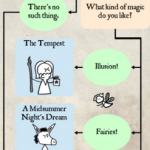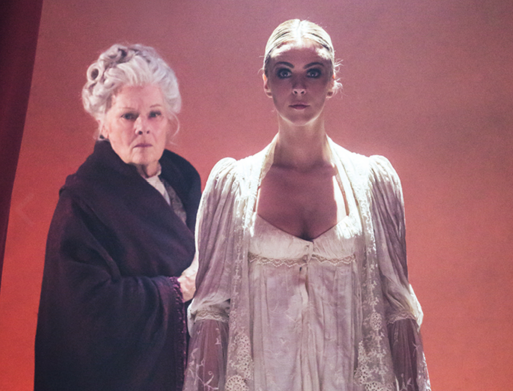Inspired by the Sondheim Symposium, my college friend Katharine Pitt offered a guest post based on her own experiences acting marriages in Shakespeare (She’s pretty awesome, so I’m sure she won’t mind me inserting a plug for Slings and Arrows in the intro to her post). I think all the rest you need to know is she’s awesome (bears repeating), the photos below were taken by William Sacco (captions courtesy of Katharine), and everything that follows is hers. Take it away, Kate, the prettiest Kate in Christendom, Kate of Kate Hall, my super-dainty Kate!
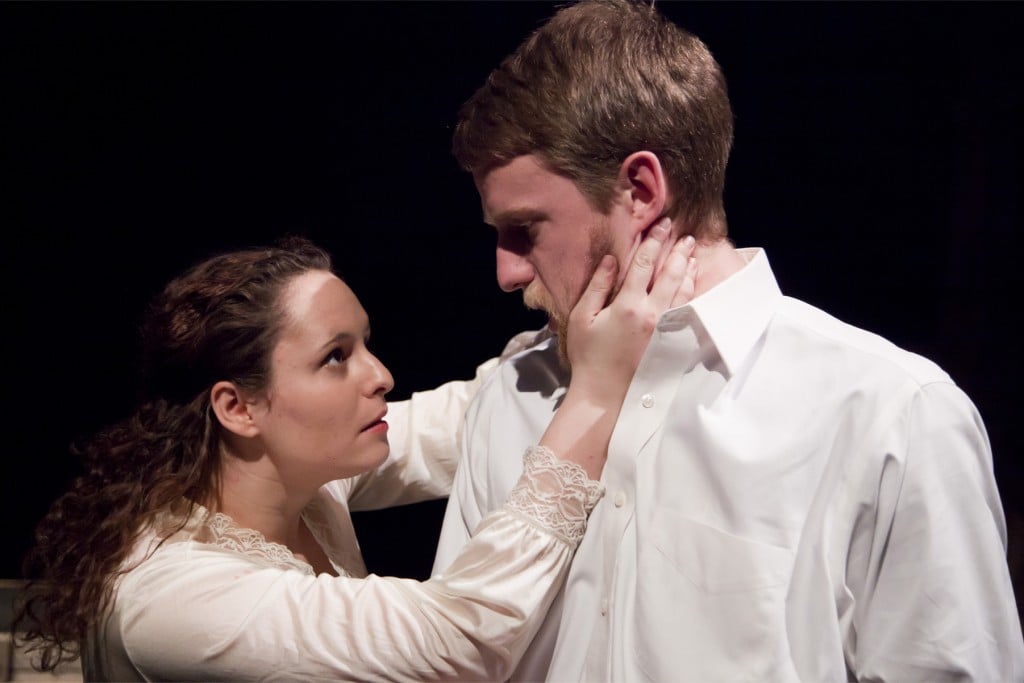
I’ve been married three times.
Six times actually, if you count the dead and divorced. Seven, if you believe Helen and Paris made things official.
Yes, that’s right, I did college theater. I’ve never been a married person but I’ve played one onstage. For myself and most of the people I know – unemployed 22-year-olds – that is the extent of our experience with the ties that bind.
I played Lady Macbeth, Gertrude, and Emilia during my last three months of college. Marriages in Shakespeare are fascinating to me because so few of them end well. All three of the women I played in Macbeth, Hamlet, and Othello die violent deaths and in each case their husbands are responsible for their sudden ends: Lady Macbeth kills herself when her husband abandons her, Gertrude is poisoned by her husband, and Emilia is stabbed by her husband.
Some scholars connect these tales of woe to Shakespeare’s personal life and claim that he had an unhappy marriage himself. At eighteen, Shakespeare married Anne Hathaway, a woman eight years his senior who was pregnant with their first child. Despite having two more children, the couple lived apart for most of their married lives and Shakespeare famously left Anne Hathaway his “second best bed” in his will. Ouch.
We will never know the truth about Shakespeare’s marriage, but that hasn’t stopped the historians, gossips and playwrights from speculating about the state of his sheets for the past four hundred years. (“Was he gay? Was he a woman? Did he have a secret love child with the dark lady who was fostered by Essex and Marlowe’s Capulet cousin”?!)
However, there are reasons to believe that the fraught marriage described by scholars is not entirely accurate, including the fact that William and Anne continued to have children after their shotgun wedding and that Shakespeare’s “second-best bed” was probably his own bed.
Although the ultimate success of Shakespeare own marriage may be open to interpretation, the marriages in his plays are universally disastrous, particularly for the women.
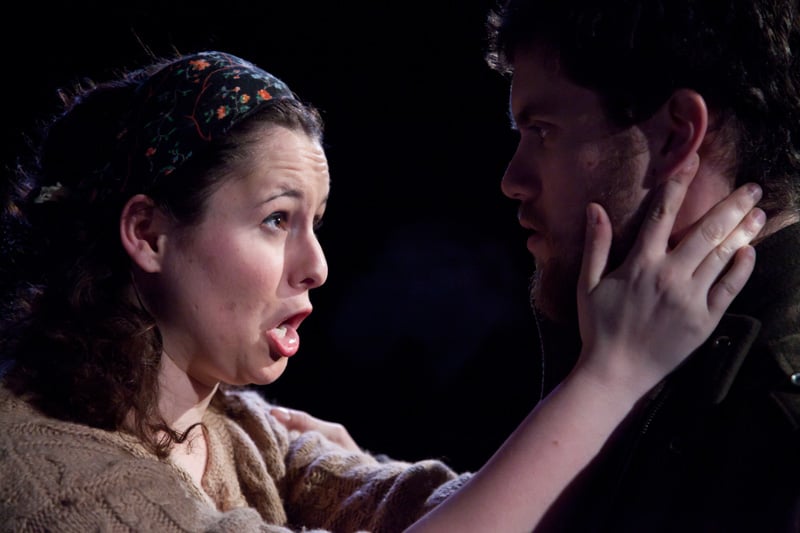
At the beginning of Macbeth, Lady M is a dominating figure, browbeating her husband into killing Duncan, and taunting him when he shows weakness. At the end of the play, she is broken and alone, talking to shadows and lost to the world.
Gertrude dies when her husband, who claims that he murdered his brother at least partly for her sake (the whole “being king” thing also had something to do with it), allows her to drink the poison meant for her son. Love meets Death and Death wins. Emilia dies when her husband stabs her after she reveals his responsibility for Desdemona’s death (another husband-wife murder.)
Both Gertrude and Emilia have about ten minutes of lying-dead-onstage time at the end of Hamlet and Othello, so I had a-lot of time to think about why exactly I was curled up on the floor, breathing shallowly and trying to avoid being stepped on. (Besides actor masochism)
Emilia, Gertrude, and Lady Macbeth die because they love their husbands too much. Emilia loves her husband so much that she tolerates his abuse and covers for his mistakes. When she finally recognizes his murderous intentions, he kills her.
Gertrude loves her husband so much that she chooses his well being over that of her son. When she finally recognizes that Claudius has in turn chosen his throne over her life, she has about ten seconds to deal with that revelation before the poison kills her. Lady Macbeth loves her husband so much that his abandonment after Duncan’s murder leaves her desolate. When she finally recognizes that her husband is lost to her forever, she kills herself.
Despite the differences between Hamlet, Macbeth and Othello, the arc of of love -> recognition -> death remains the same for Gertrude, Lady Macbeth, and Emilia. Despite major differences in family life (Gertrude is a mother, Lady Macbeth was a mother, and Emilia will never be a mother) and status (Gertrude is queen, Lady Macbeth becomes queen, and Emilia will never be queen), all three women share the same fault (love) and the same fate (death).
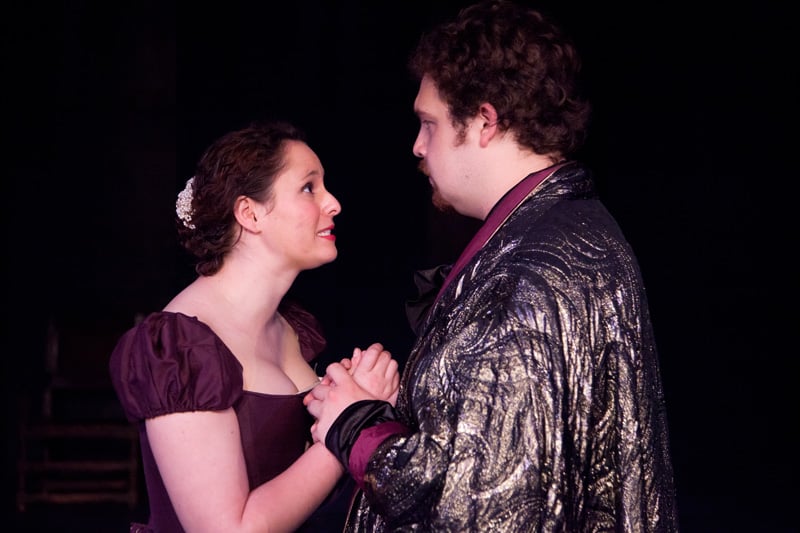
So, what lessons can I take away from the experience of playing these three women? Hopefully not, “Never marry because you will die sad and lonely” because that would just be sad. I think a better answer is rather a) be grateful I don’t live in a Shakespearean tragedy and b) sh*t happens.
In both real life and in the theater, people grow apart. Things go wrong in marriages, and the solution isn’t always as simple as “Well, don’t kill the King of Scotland next time, okay?” My parents were divorcing while I was working on these three roles and as far as I know, neither of them has ever killed anyone. Relationships break in our world and in Shakespeare’s. We are just lucky that more marriages on our side end with splitting assets rather than heads.


